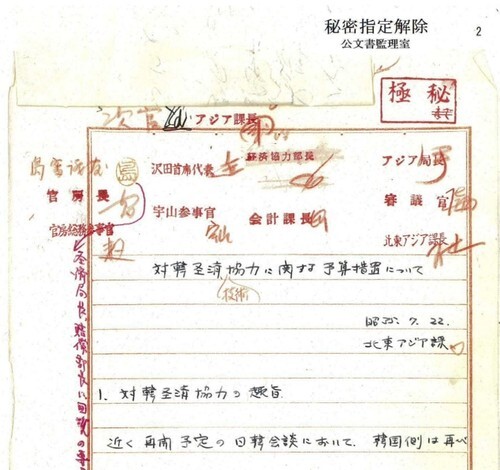hankyoreh
Links to other country sites 다른 나라 사이트 링크
Recently declassified document reveals Japan’s intent to avoid paying compensation to S. Korea

A recently declassified Japanese government document from the 1960s recommended that economic cooperation with South Korea not be categorized as compensation for Japan’s colonial occupation of Korea. While the Japanese government’s attitude was partially reflected in the agreement it reached with South Korea in 1965 settling outstanding claims, neither of the governments were able to deny the existence of individuals’ right to make claims. That right served as the grounds for the South Korean Supreme Court’s ruling that Japanese companies must pay compensation to victims of forced labor during the colonial occupation.
On Mar. 1, a Japanese NGO pushing for the publication of all documents related to South Korea-Japan dialogue posted on its website a document about budget funding for economic and technological cooperation with South Korea that was drafted on July 22, 1960, after acquiring the document from Japan’s Ministry of Foreign Affairs (MOFA Japan). Several sections of the document show that the Japanese government had no intention of compensating South Korea for its colonial occupation. This top-secret document was drafted by MOFA Japan’s Northeast Asia Division while South Korea and Japan were negotiating the normalization of their diplomatic relations in 1960.
“It’s appropriate to hold off on the issue of property claims [between the two countries]. At the same time, we need to provide some kind of economic cooperation with South Korea in order to reach a breakthrough in our bilateral talks. It’s acknowledged that providing economic aid would be also meaningful for Japan if it’s presented as a contribution to the economy of the future rather than compensation for the past,” the document said.
Noting that Japan had provided Laos and Cambodia economic assistance and compensation in exchange for them giving up their right to make claims against Japan, the document said that South Korea represented a similar situation. After the normalization of diplomatic relations with South Korea, the document said, “we think it would be appropriate to provide US$20 million a year in aid for economic cooperation for a total of US$100 million over five years.”
The document also quoted a senior official at MOFA Japan as voicing the following opinion: “Unless the South Koreans give up all their rights to make claims, grant-type aid won’t be able to gain domestic support.”
The normalization of relations between the two countries occurred five years later when they concluded a treaty on basic relations, as well as an ancillary agreement settling outstanding claims. But the question of whether individuals retain the right to make claims was raised in Japan even after the claims agreement was concluded. Shunji Yanai, director-general of the MOFA Japan Treaties Bureau, told the Diet in 1991 that the individual right to make claims hadn’t expired. Aside from the fundamental question of whether the individual right to make claims can be negated through negotiations between two states, another reason the Japanese government has been unable to deny that right is because that denial would also apply to Japanese citizens.
The declassified document was addressed during a demonstration in Tokyo on Feb. 28 by Fumitoshi Yoshizawa, a professor at Niigata University of International and Information Studies and author of the book “Japan-Korea Summit 1965,” which deals with how the two countries negotiated their treaty establishing basic relations and their associated claims agreement. “The Japanese government has responded to the Supreme Court’s ruling by focusing solely on the 1965 claims agreement without making any mention of the issue of interpretation. While South Korea has made most of its diplomatic documents public, Japan hasn’t done so. It’s trying to place the burden of proof on South Korea without releasing enough documents,” Yoshizawa said.
By Cho Ki-weon, Tokyo correspondent
Please direct comments or questions to [english@hani.co.kr]

Editorial・opinion
![[Column] Season 2 of special prosecutor probe may be coming to Korea soon [Column] Season 2 of special prosecutor probe may be coming to Korea soon](https://flexible.img.hani.co.kr/flexible/normal/500/300/imgdb/original/2024/0426/3317141030699447.jpg) [Column] Season 2 of special prosecutor probe may be coming to Korea soon
[Column] Season 2 of special prosecutor probe may be coming to Korea soon![[Column] Park Geun-hye déjà vu in Yoon Suk-yeol [Column] Park Geun-hye déjà vu in Yoon Suk-yeol](https://flexible.img.hani.co.kr/flexible/normal/500/300/imgdb/original/2024/0424/651713945113788.jpg) [Column] Park Geun-hye déjà vu in Yoon Suk-yeol
[Column] Park Geun-hye déjà vu in Yoon Suk-yeol- [Editorial] New weight of N. Korea’s nuclear threats makes dialogue all the more urgent
- [Guest essay] The real reason Korea’s new right wants to dub Rhee a founding father
- [Column] ‘Choson’: Is it time we start referring to N. Korea in its own terms?
- [Editorial] Japan’s rewriting of history with Korea has gone too far
- [Column] The president’s questionable capacity for dialogue
- [Column] Are chaebol firms just pizza pies for families to divvy up as they please?
- [Column] Has Korea, too, crossed the Rubicon on China?
- [Correspondent’s column] In Japan’s alliance with US, echoes of its past alliances with UK
Most viewed articles
- 1‘We must say no’: Seoul defense chief on Korean, USFK involvement in hypothetical Taiwan crisis
- 2[Column] Season 2 of special prosecutor probe may be coming to Korea soon
- 3N. Korean delegation’s trip to Iran shows how Pyongyang is leveraging ties with Moscow
- 4Amnesty notes ‘erosion’ of freedom of expression in Korea in annual human rights report
- 5[Reportage] On US campuses, student risk arrest as they call for divestment from Israel
- 6Korea sees more deaths than births for 52nd consecutive month in February
- 7[Editorial] New weight of N. Korea’s nuclear threats makes dialogue all the more urgent
- 8‘Weddingflation’ breaks the bank for Korean couples-to-be
- 9[Column] Has Korea, too, crossed the Rubicon on China?
- 10[Column] Park Geun-hye déjà vu in Yoon Suk-yeol